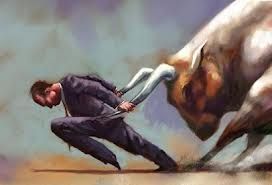Ethics and Morality
Two Ways to "Win" in a No-Win Situation
When positive options aren't available, how do you redefine success?
Posted January 28, 2013

My title probably sounds paradoxical, or like a trick question. And in fact trick questions—similar to Catch-22s, double binds, standoffs, conundrums, and quandaries—are all terms describing a lose-lose, or no-win, scenario. Yet finding yourself in such a predicament is hardly uncommon. Which doubtless explains why there are so many expressions describing this plight: such as a Pyrrhic victory; a Hobson’s choice; damned if you do, damned if you don’t; making a deal with the Devil; having to choose between the lesser of two evils; being between a rock and a hard place; and being on the horns of a dilemma.
So, can you somehow escape the inescapable? Regrettably, the most positive answer that can be offered here stops well short of being entirely satisfying. For it’s, well, yes and no.
Take, for instance, the creative “solution” to the key dilemma posed in Joseph Heller’s absurdist masterpiece Catch-22. The only way that the U.S. Air Force bombardier Yossarian—the novel’s lead character (or maybe, lead victim)—can escape additional flying missions (whose number perpetually gets raised) is through appealing to the military’s Catch-22 release policy. It’s a protocol which states that to get out of further combat duty the applicant must fulfill two criteria: he must be insane and he must explicitly request the discharge. But the military’s subverted, contradictory logic renders such a dismissal impossible. For it regards the very act of asking to be grounded as defining the candidate as sane . . . and therefore ineligible.
So Yossarian is hopelessly boxed-in by rules, regulations, and procedures subject neither to debate nor appeal. Forced to live in a world governed by such rigidly negative conditions, there’s only one way he can “win.” And I’m obliged to insert quotation marks around the word, for such a victory is necessarily circumscribed. It hardly denotes winning in the traditional sense. It’s a victory of consciousness, or conscience, rather than a defeat over some hostile power. Put somewhat differently, the winning has more to do with transcendence than triumph.
In Yossarian’s case, his paradoxical victory cannot be in fighting the system directly, for the system is expressly designed to crush all protests. His only alternative then is to flee the system, although the novel clearly implies that ultimately such flight isn’t really tenable either. In consequence, Yossarian’s victory needs to be understood as more symbolic than real: an affirmation of his personal values and humanity rather than a defeat over forces that remain beyond his control.
In an interview (see A Catch-22 Casebook), Heller describes Yossarian’s situation this way: “His environment, his society . . . the world itself . . . closes off every conventional area of protest or corrective action, and the only choice that’s left to him is one of ignoble acceptance in which he can profit and live very comfortably [for he’s been offered a bribe] . . . or flight, a renunciation of that condition, of that society, that set of circumstances. / The only way he can renounce it without going to jail is by deserting it, trying to keep going until they capture him. I like to think of him as a kind of spirit on the loose.”
Which is to say that even though he’ll almost certainly be captured, his “spirit”—what he stands for—is unvanquishable. So one way you can “win” in an unwinnable situation is simply to leave the field altogether, to refuse to engage others in a situation offering no acceptable alternative. To protect your integrity (which, finally, may be your most precious asset), you choose not to comply with either unacceptable option. And compare this “win” with the dictum: “Of two evils, choose neither.”

But what if—in cases, frankly, you’re much more likely to encounter—you really are obliged to choose one of two or more unsatisfactory alternatives? Cases in which totally avoiding or exiting from the situation just isn’t an option?
A good example of this might be detesting your job but desperately needing to hold onto it for financial survival. Given the circumstance that (1) you have a family to support, (2) you’re confronted with terrible market conditions (at least for someone with your qualifications), and (3) the fact that you’ve already done everything possible to find a more suitable position, your sole choice, practically, is to stay put—and that, indefinitely. Here is where your only (admittedly, qualified) win is to transform your situational perspective.
And this can be simpler than you imagine. Granted, you’re still not going to be joyful about your current employment. But you can nonetheless adopt a more adaptive “script” on your misfortune. Which might go something like his:
“I choose to stay where I am right now because, realistically, there just aren’t any good alternatives. I could quit but that would lead to much greater hardship than what I’m dealing with now. So I hereby resolve to stop seeing myself as a victim. For I’m consciously choosing to stay where I am.
“If I’ve been feeling exploited, I can now take the different tack of seeing myself as “exploiting” this position so I can support my family as I continue (patiently!) to explore ways of eventually getting out of this mess. And every time this #@& job starts to get to me, I’ll remind myself that every option I’ve looked at is actually worse. . . . In other words, I refuse to see myself as a victim, and I’m not going to let myself get bitter about this.”
Obviously, if you absolutely despise your job, it will take a good deal of self-discipline to alter your self-talk like this. It will also take practice and a strong determination not to feel sorry for yourself—not to “luxuriate” in some sort of tender self-pity. But you’ll probably feel a lot better about the situation—and yourself—if you can cultivate such an attitude of acceptance. Which, I might add, is not the same as resignation. Nor will mere tolerance be of much help here, since such a begrudging attitude implies substantial internal tension.
Consider this wonderfully ironic expression: “To get what you want, want what you get.” Or, “Anything you accept, you can be happy with” (okay, maybe a bit of an exaggeration here). Still, if you can adopt an attitude that positively addresses whatever challenging situation you’re confronted with, such an attitudinal shift will help you better accept your—for now—unchangeable situation. That way you’ll no longer have to feel overcome or defeated by it.
After all, you don’t have to like something to accept it as expedient—as the best that, right now, you can hope for. Such acceptance is the difference between fighting yourself over a battle that realistically can’t be won and consciously choosing not to fight it, resent it, or get bitter over it. But just to go along with it as your present-day reality requires. And to save your vital energy for battles that, going forward, can be won.
Note: If you can think of anyone who might profit from reading this post, kindly send them the link.
Also, if you'd like to explore other articles I've written for Psychology Today, click here.
© 2013 Leon F. Seltzer, Ph.D. All Rights Reserved.
---I invite readers to join me on Facebook and follow my psychological musings on Twitter.




